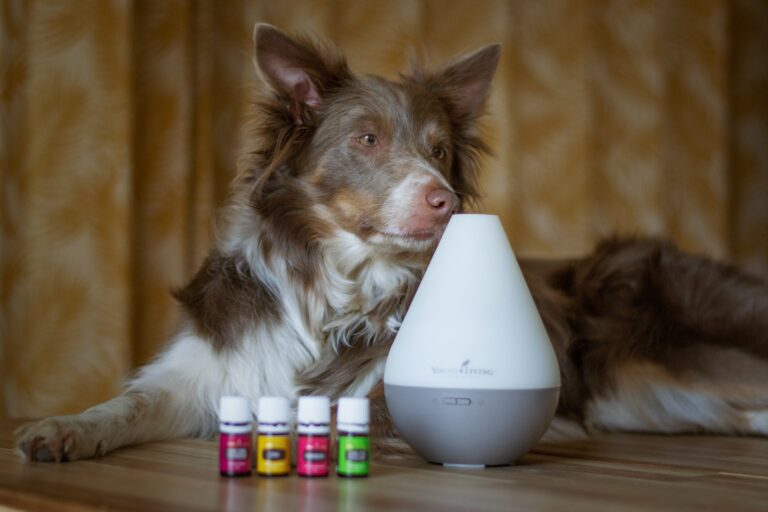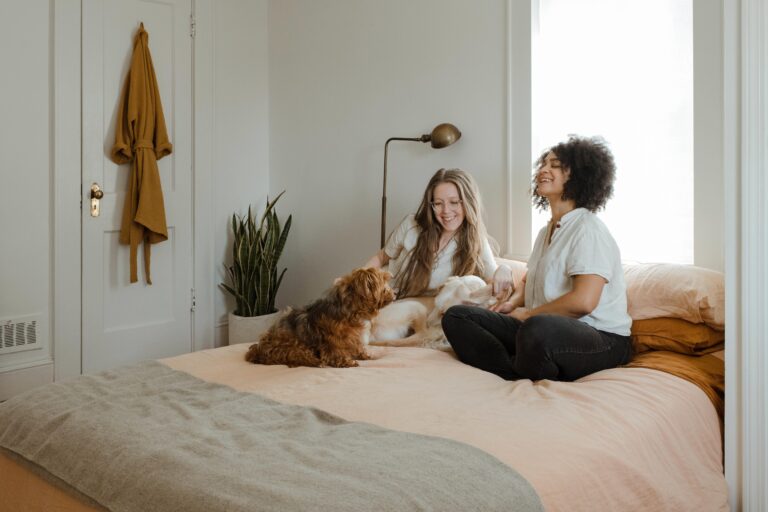Nurturing Nature: A Comprehensive Look at Essential Oils for Pets
Alright folks, let’s take a deep dive into the world of essential oils for pets. You might have seen an ad pop up on your social media feed about the latest lavender-infused shampoo that promotes canine relaxation. Or perhaps, you’ve caught wind of your friend raving about how her cat’s coat has never been silkier after using chamomile essential oils. Indeed, these tiny aromatic miracles have taken the pet world by storm.
But a word of caution – ensuring the safety and suitability of these oils for your pets is too crucial to overlook. After all, owning a pet isn’t only about cuddly hugs and fun fetches; it’s also about their well-being, right?
Understanding Essential Oils for Pets
Essential oils, friends, are ultra-concentrated plant extracts. From lavender to peppermint, there are several oil types safe for our furry friends, if used carefully. But the brain-bending science behind how these oils work is what truly fascinates me. These oils interact with an animal’s nervous system, triggering beneficial physiological responses.
However, let’s not get lost in all the flowery talk—some oils can be harmful to pets. Even harmless-sounding names like Pennyroyal or Wintergreen are a big no-no. Yup, it’s easy to slip up in the whirlwind of misconceptions floating on the web. I urge you to stay aware and double-check everything!
Benefits and Uses of Essential Oils for Pets
On the bright side of things, essential oils can be a game-changer for pet health. These oils pack a punch! They can alleviate anxiety, control odors, and even aid wound healing. Imagine your dog, Mr. Fluffkins, chilling out in a lavender-scented room, his usual thunderstorm anxiety a thing of the past. Or consider your cat, Purrincess, smelling oh-so-marvelous without the usual markings or funky, I-spent-the-entire-day-exploring-who-knows-where odors.
And guess what? Essential oils in pet grooming can be a delightful surprise. A hint of pet-friendly oils in their grooming products can upgrade your pet’s bath time to a spa-like experience. So go ahead, try it. Your pet will be strutting around the house like a furred diva!

Risks and Precautions: Essential Oils and Pets
Hold your horses! Or rather, your oil bottles. Essential oils come with a parasol of risks for pets too. Their sensitive noses and bodies might not always react too well to them. Therefore, it’s crucial to know the signs of an adverse reaction – drooling, vomiting, or even a seizure.
We need to tread gently here. When using essential oils for pets, keep the dosages light and always dilute them correctly. And always remember – if your pet retreats from the oil’s scent, respect their choice. Pets have a funny way of knowing things we don’t, don’t they?
Essential Oils for Different Pet Species
Pet care isn’t a one-size-fits-all approach, especially when it comes to essential oils. Your friendly Fido might enjoy a hint of marjoram oil during his daily massage, but the same oil might not sit well with your cat Whiskers. Heck, even exotic pets like birds or snakes have their unique needs when it comes to essential oils. Therefore, ensure you have the thumbs-up from vets and pet professionals for every garlic (or oil, in this case) you add to your pet’s broth.

Essential Oils That Are Safe For Pets
Lavender Oil – The Calming Essence
- Benefits for Pets: Helps soothe anxiety, reduces stress, and aids in promoting sleep.
- Application: Dilute a couple of drops in water and create a calming mist or apply directly to their bedding.
Chamomile Oil – Gentleness in a Bottle
- Benefits for Pets: Relieves skin irritations, eases digestive discomfort, and helps with anxiety.
- Application: Mix a few drops with coconut oil and gently massage into their skin or add to their aromatherapy diffuser.
Frankincense Oil – The All-Purpose Oil
- Benefits for Pets: Boosts immune system, promotes cellular health, and supports a calming environment.
- Application: Dilute with a carrier oil and massage near the ears or diffuse it in a well-ventilated area.
Cedarwood Oil – Keeping Fleas at Bay
- Benefits for Pets: Acts as a natural insect repellent, eases skin irritations, and promotes a calming effect.
- Application: Dilute with water and mist their fur or mix with a carrier oil for a relaxing massage.
Rosemary Oil – Aromatic and Invigorating
- Benefits for Pets: Enhances cognitive function, improves circulation, and promotes healthy fur.
- Application: Mix a few drops with water and spray onto their brush before grooming or use a diffuser in their vicinity.
Ginger Oil – Comfort and Digestion
- Benefits for Pets: Alleviates nausea and motion sickness, supports digestive health, and reduces joint pain.
- Application: Dilute with a carrier oil and massage onto their abdomen or mix with water and apply as a compress.
Ylang Ylang Oil – Serenity in a Bottle
- Benefits for Pets: Relieves stress and anxiety, aids in relaxation, and promotes a peaceful environment.
- Application: Add a few drops to their favorite blanket or collar or use a diffuser to create a calming space.
Carrot Seed Oil – Support for Aging Pets
- Benefits for Pets: Nourishes the skin, boosts the immune system, and supports joint health in senior pets.
- Application: Dilute with a carrier oil and massage onto their joints or add a few drops to their bathwater.
Helichrysum Oil – Healing Power
- Benefits for Pets: Aids in wound healing, reduces inflammation, and soothes skin irritations.
- Application: Dilute with a carrier oil and apply directly to their skin or mix with water as a compress.
Lemongrass Oil – Fresh and Energizing
- Benefits for Pets: Repels insects, promotes healthy fur, and improves circulation.
- Application: Dilute with water and spray onto their fur or mix with a carrier oil for a rejuvenating massage.
Rose Geranium Oil – The Balancing Act
- Benefits for Pets: Acts as an insect repellent, helps with skin conditions, and supports emotional balance.
- Application: Mix with water and spray onto their bedding or dilute with a carrier oil and massage onto their skin.

Essential Oils That Are Dangerous For Pets
Pets, particularly cats and dogs, have a heightened sense of smell compared to humans. They also have more vulnerable bodies, especially when it comes to metabolizing certain substances. Essential oils contain compounds that can pose a risk to their health. When pets come into contact with toxic essential oils, whether through inhalation, ingestion, or topical exposure, it can lead to mild to severe health issues.
Essential Oils That are Toxic to Pets
Tea Tree Oil
Tea tree oil, often used in skincare products and as a natural disinfectant, can be highly toxic to pets. If ingested or applied to their skin, it can cause vomiting, drooling, muscle weakness, tremors, and even coma.
Peppermint Oil
While humans enjoy the invigorating scent of peppermint oil, it can be hazardous to pets. Ingestion or excessive exposure to this oil may lead to digestive upset, breathing difficulties, and liver damage.
Eucalyptus Oil
Eucalyptus oil is commonly known for its ability to relieve congestion and soothe respiratory issues. However, for pets, it can cause excessive drooling, lethargy, weakness, and even seizures if consumed.
Citrus Essential Oils
Citrus essential oils, such as orange, lemon, and grapefruit, may smell refreshing to us, but they can cause harm to pets. Ingestion of citrus oils can result in vomiting, diarrhea, depression, and potential central nervous system disorders.
Clove Oil
Clove oil is widely used for its analgesic and antifungal properties. However, pets are highly sensitive to this oil, and even a small amount can lead to liver and kidney damage, difficulty breathing, and gastrointestinal issues.
Cinnamon Oil
Cinnamon oil, often used for its warming aroma, can also be toxic to pets. Ingesting or inhaling large amounts of cinnamon oil can cause mouth burns, vomiting, diarrhea, low blood sugar, and liver disease.
Wintergreen Oil
Wintergreen oil contains a high level of methyl salicylate, which can be extremely toxic to pets. Ingesting or coming into contact with this oil can lead to severe gastrointestinal ulcers, breathing difficulties, and organ failure.
Pine Oil
Pine oil, commonly found in household cleaners and air fresheners, can be dangerous for pets. Inhalation or ingestion of pine oil can cause respiratory distress, skin irritation, and gastrointestinal upset.
Pennyroyal Oil
Pennyroyal oil is known for its insect-repellent properties and is often used in pet shampoos. However, it can be toxic to pets when ingested, causing symptoms such as liver damage, seizures, and even miscarriage in pregnant pets.
Lavender Oil
While lavender oil is generally considered safe for pets, it can still cause adverse effects if not used properly. Ingesting large amounts of lavender oil may lead to upset stomach, vomiting, and difficulty breathing.

What to Do If Your Pet is Exposed to Toxic Essential Oils
If you suspect your pet has been exposed to toxic essential oils, take the following measures:
- Remove your pet from the source of exposure.
- Do not induce vomiting unless specifically instructed by a veterinarian.
- Contact your veterinarian or an animal poison control hotline immediately for guidance.
- Provide any relevant information, such as the type of essential oil and the quantity ingested or exposed to.
Using essential oils around pets can be a wonderful addition to their daily routine, providing numerous benefits when used correctly. However, it’s crucial to remember that pets have unique sensitivities, and caution must be exercised. Always start with small dilutions, observe your pet’s reactions, and consult with a veterinarian if uncertain.
Remember to always consult with a veterinarian before introducing essential oils into your pet’s routine to ensure their safety and well-being.
Frequently Asked Questions
While essential oils can provide various benefits to pets, some oils can be toxic. It is essential to use only pet-safe oils and to properly dilute them before use.
Start by using a minimal amount of diluted oil and observe your pet’s behavior and reactions. Signs of sensitivity may include lethargy, sneezing, coughing, or excessive licking.
Yes, many essential oils have calming properties that can help reduce anxiety in pets. Lavender, chamomile, and ylang-ylang are known for their soothing effects.
Cats are more sensitive to certain essential oils, such as tea tree and citrus oils. Always research and ensure the oils you use are safe for feline friends.
It is generally recommended to dilute essential oils with a carrier oil before applying them to your pet’s fur. This helps avoid any potential irritation or discomfort.
The duration can vary depending on the specific oil, its concentration, and the ventilation in the area. However, it is best to keep pets away from any room where essential oils have been diffused until the scent has dissipated completely.
Cats are more sensitive to essential oils than dogs due to their unique metabolism. Certain oils that may be safe for dogs can be toxic to cats. Consult with your veterinarian about the specific oils you plan to use.
Small mammals like rabbits and guinea pigs have delicate respiratory systems and can be extremely sensitive to essential oils. It is best to avoid using essential oils around them to prevent any adverse reactions.


